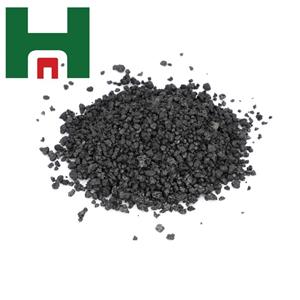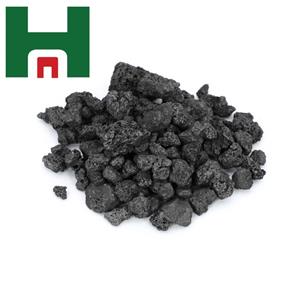Improving anode quality is of great significance to aluminum electrolysis production!
In the process of aluminum electrolysis, the poor quality of anode, such as low false density, high porosity, low resistivity, low mechanical strength, will cause excessive consumption of anode in the process of aluminum electrolysis. For example, the anodic air oxidation rate, anodic Buda reaction rate, aluminum electrolysis side reaction and dust rate increase; It will also reduce the conductive area of the anode, increase the current density of the anode, increase the calorific value of the anode, decrease the conductivity of the electrolyte, increase the voltage drop between the anode and the electrolyte, and increase the power consumption. The reason for the increase of electrolyte voltage drop is that anode dust (or carbon slag) enters the electrolyte, and the carbon particles become polar substances, which increases the viscosity of the electrolyte and leads to the decrease of electrolyte conductivity. On the other hand, due to the heating of anode and electrolyte, the temperature of aluminum electrolysis increases, and the side reactions accelerate, which leads to the reduction of current efficiency and the increase of power consumption. The poor anode will seriously affect the normal production of aluminum electrolysis due to various factors such as high ash content, high specific resistance, high porosity, poor strength, cracks, faults, loose structure and so on.
(1) High ash content
Anode ash mainly comes from petroleum coke. The greater the ash content, the more impurities such as iron, silicon, vanadium and sodium. Among them, the oxides of iron and silicon will enter the liquid aluminum and reduce the grade of aluminum: vanadium and sodium are not only catalysts for accelerating anodic oxidation, but also reduce current efficiency and increase production costs, which will have a great impact on the electrolytic process and product quality. The national standard requires that the ash content of calcined coke shall not be greater than 0.5% ∞ ".
(2) Cracks and faults
Uneven kneading or poor control of molding temperature and baking temperature will cause cracks in the products. Cracks around the carbon bowl are easy to cause anode falling off: cracks or inclusions in the anode block will cause anode fault, prevent the passage of vertical current, and finally fall off the block. Thus, the vertical and horizontal current distribution of the cell will be changed, so that the current efficiency will be reduced. At the same time, taking out the falling anode and falling block will destroy the established balance of the electrolytic cell and affect the stable operation.
(3) Anode "long bag"
Due to poor kneading effect and other factors, the overall performance of the anode is different, and the consumption speed is different, which will cause local "long package" of the anode, thus affecting the current distribution and significantly reducing the aluminum output.
(4) Anode porosity
Due to improper formula or insufficient calcination, kneading, molding, calcination and other factors, the anode will have high porosity, insufficient strength, loose structure, accelerated anodic oxidation, increased consumption, and increased carbon residue in the electrolyte. In the same aluminum electrolysis environment, high-quality anode can improve current efficiency and reduce anode consumption. It is allowed to increase the capacity of the electrolytic cell by increasing the current density (which can withstand 0.76apcm2 ~ 0.8apem2), improve current efficiency and reduce power consumption, and produce good economic benefits. At the same time, it can also improve the environment of the electrolysis workshop and reduce the labor intensity of workers.



